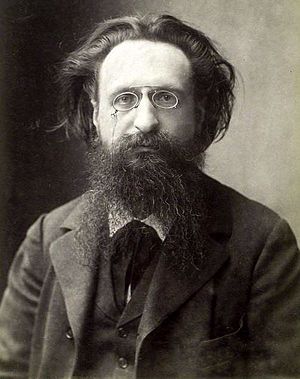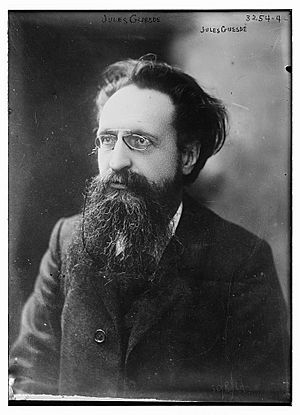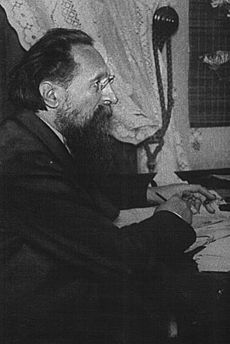Jules Guesde facts for kids
Quick facts for kids
Jules Guesde
|
|
|---|---|
 |
|
| Born |
Jules Bazile
11 November 1845 Paris, France
|
| Died | 28 July 1922 (aged 76) Saint-Mandé, France
|
| Political party | French Workers' Party Socialist Party of France SFIO |
| Parent(s) | François Bazile Eléonore Guesde |
| Relatives | Lilian Constantini (granddaughter) Dominique Schneidre (great-granddaughter) |
Jules Bazile, known as Jules Guesde (born November 11, 1845 – died July 28, 1922), was an important French journalist and politician. He was a leading figure in the early socialist movement in France.
Jules Guesde is famous for inspiring a quote from Karl Marx. Marx, who created the idea of Marxism, wrote a letter to Guesde and Paul Lafargue. They both claimed to follow Marx's ideas. However, Marx felt they were too extreme. This led to Marx's famous saying: "What is certain is that [if they are Marxists], then I myself am not a Marxist." This meant Marx didn't always agree with how others used his ideas.
Contents
Jules Guesde's Life Story
Early Years and Ideas
Jules Bazile was born in Paris, France. He started working as a clerk for the French government. Later, he became a writer for republican newspapers. He chose "Jules Guesde" as his pen name, using his mother's last name.
During the Franco-Prussian War, Guesde was editing a newspaper called Les Droits de l'Homme. He had to flee to Geneva in 1871. This was because of articles he wrote supporting the Paris Commune, a revolutionary government. While in Geneva, he read the works of Karl Marx.
In 1876, Guesde returned to France. He quickly became one of the main supporters of Marxism in the country. Marxism is a political and economic theory. It suggests that society should be classless and that the means of production should be owned by everyone. In 1878, he was jailed for six months. This was for taking part in the first International Congress in Paris. He also edited several newspapers like Les Droits de l’Homme and Le Socialiste. His most famous paper was the weekly Égalité.
While in prison, Guesde wrote an important statement. It was adopted by many at the Socialist Workers' Congress in 1879. The statement said that property was the main social issue. It argued that the current system was unfair. Some people produced everything, while others had all the wealth. The statement called for the community to own land, raw materials, and tools.
Guesde worked closely with Paul Lafargue, who was Karl Marx's son-in-law. Together with Marx and Lafargue, Guesde helped create the program for the French Workers' Party in 1880. This program focused on forming an international workers' party. It aimed to achieve its goals through revolutionary methods. However, at the next congress, Guesde's strict Marxist ideas faced opposition. Other socialists, called "possibilists," preferred a more gradual approach. They wanted to make reforms instead of a full revolution.
A Leader for Change
At the Congress of Saint-Étienne, the differences among socialists grew. Those who refused to compromise with the existing capitalist government followed Guesde. They were known as the "intransigents." The reformists formed their own groups. Guesde was very active in these debates.
In 1893, Guesde was elected to the Chamber of Deputies. This is like being a member of parliament. He represented the city of Roubaix. He proposed many social laws that were part of the Workers' Party program. In 1894, he led a two-day discussion in the Chamber about the idea of collective ownership.
He was not re-elected in 1902 but won his seat back in 1906. In 1903, different parts of the socialist party formally reunited. They formed the Socialist Party of France. By 1905, all socialist groups in France joined together. They formed the French Section of the Workers' International (SFIO).
Even after the parties united, Guesde continued to oppose the reformist ideas of Jean Jaurès. Jaurès believed in working within the existing system. Guesde criticized Jaurès for supporting one "bourgeois" (middle-class) party over another. In 1900, Guesde also disagreed with socialists joining "bourgeois" governments. He also supported the freedom of religious groups. This was during a time when the French government was separating church and state.
In 1907, during a protest by Languedoc winegrowers, Guesde worked with Jaurès. They proposed that the government should take over wine estates.
Later Life and Legacy
When World War I started in 1914, Guesde's views changed. The war threatened France's existence. Guesde joined the national unity government of René Viviani. He served as a minister without a specific department until 1916. During this time, he adopted patriotic views. He believed the war would lead to a social revolution in France. He thought this would then start an international revolution.
After the war ended, at the Congress of Tours, Guesde chose to stay with the SFIO. This was against the majority who formed the French Communist Party. Vladimir Lenin, a Russian revolutionary, criticized Guesde for this choice.
Jules Guesde died on July 28, 1922. Besides his many political writings, he published two volumes of his speeches in 1901. They were called Quatre ans de lutte de classe 1893-1898 (Four years of class struggle).
Images for kids
See also
 In Spanish: Jules Guesde para niños
In Spanish: Jules Guesde para niños




